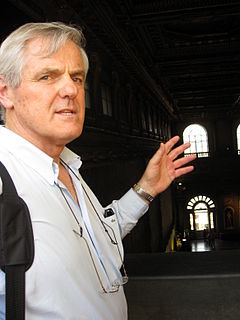A Quote by John Todd
The
blending of architecture, solar, wind, biological and electronic
technologies with housing, food production, and waste utilization within
an ecological and cultural context will be the basis of creating a new
...design science for the post-petroleum era.
Related Quotes
Personally, I have been very impressed by the slow food movement. It is about celebrating the culture of food, of sharing the extraordinary knowledge, developed over millennia, of the traditions involved with quality food production, of the sheer joy and pleasure of consuming food together. Especially within the context of family life, this has to be one of the highest forms of cultural activity.
The only truly dependable production technologies are those that are sustainable over the long term. By that very definition, they must avoid erosion, pollution, environmental degradation, and resource waste. Any rational food-production system will emphasize the well-being of the soil-air-water biosphere, the creatures which inhabit it, and the human beings who depend upon it.
Computer science only indicates the retrospective omnipotence of our technologies. In other words, an infinite capacity to process data (but only data -- i.e. the already given) and in no sense a new vision. With that science, we are entering an era of exhaustivity, which is also an era of exhaustion.
Some experts say we are moving back to the pre-antibiotic era. No. This will be a post-antibiotic era. In terms of new replacement antibiotics, the pipeline is virtually dry. A post-antibiotic era means, in effect, an end to modern medicine as we know it. Things as common as strep throat or a child's scratched knee could once again kill.
Housing has always been a key to Great Resets. During the Great Depression and New Deal, the federal government created a new system of housing finance to usher in the era of suburbanization. We need an even more radical shift in housing today. Housing has consumed too much of our economic resources and distorted the economy. It has trapped people who are underwater on their mortgages or can't sell their homes. And in doing so has left the labor market unable to flexibly adjust to new economic realities.
































